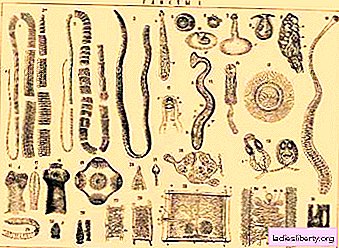
If the husband does not want children, this is a psychological problem. And if you can’t?
Male infertility - This is a disease in which the fertilization of a female egg is impossible.
Statistics show that:
- in 30% of healthy married couples pregnancy occurs during the first three months of marriage;
- 60% - over the next 7 months;
- in 10% - after 11 - 12 months of regular sexual activity.
Therefore, if pregnancy does not occur within a year, you can raise the issue of infertility and begin examination and treatment.
About male infertility, we are talking about in cases where a woman is healthy, and a man has a low fertilizing ability of sperm.
More than 90% of infertility in men is treatable, it is only necessary to consult a specialist on time.
Infertility in men - causes
Infertility in men, whose causes are diverse, occurs in 40%, respectively, in women - in 60%.
The most common causes of infertility in men are:
- inflammatory and infectious diseases of the urogenital sphere;
- varicocele - varicose veins of the spermatic cord;
- violation of ejaculation
- congenital malformations
- consequences of surgical interventions (hernia on the bladder, inguinal hernia);
- chronic diseases (cirrhosis, infectious mumps, tuberculosis, etc.);
- chemotherapy, radiation therapy, hormone therapy, taking tranquilizers, narcotic, antihypertensive drugs;
- chromosomal pathology.
A separate item can be put endocrine forms of infertility.
In addition to the main ones listed above, there are the following common risk factors:
- abuse of alcohol and smoking;
- scrotal injury;
- overheating associated with any factors: fever in infectious diseases, work in high temperatures;
- food factor.
In more detail - about the most common causes of male infertility
1. The first places among the causes of infertility are venereal and inflammatory diseases of the genitourinary system. Some causative agents of sexually transmitted diseases themselves can cause changes in sperm, constantly being in the human body. For example, chlamydia, functioning directly in the mucous membranes of the genitals, worsening sperm quality, are the cause of infertility. Chlamydia and gonococcus after infections leave a completely blocked deferent duct. Treatment in such cases is a long and complicated process.
2. Non-specific inflammatory processes (urethritis, prostatitis) affect spermatogenesis, reduce sperm motility, which reduces the chance of conception.
3. Some infectious diseases (epiparotitis - "mumps") can cause the development of infertility. Even a severe cold with high fever can suppress sperm production. In this case, however, this is a temporary phenomenon, and everything is restored in two to three months.
4. Stress, although it does not take first place among the reasons leading to infertility, is an important factor in modern life. This may include chronic fatigue, and lack of sleep, and work without rest, which affects the functions of the reproductive system.
5. Often a common risk factor is chemical. Even if a person does not work in hazardous production, almost every man breathes vapor of automobile fuel. It is necessary to remember the adverse effect of the vapor of gasoline vapor on the reproductive function.
6. Another cause of infertility, which is rarely mentioned and sometimes not taken into account, is anabolic steroids. Many people accept them independently and completely uncontrollably in order to look more courageously. The expected result will soon come, but over time they will begin to suppress the activity of the testicles: they will cease to produce enough sperm, and soon they may completely atrophy.
In connection with such a diverse and long list of causes of infertility in men, treatment is prescribed only after a full examination and clarification of the immediate cause in each case.
Reproductive dysfunction in men is diagnosed more easily than in women: sometimes it is enough to conduct a spermogram. In addition, an ultrasound of the genitals, dopplerography of the vessels of the pelvic organs; blood tests for infections and sex hormones, analysis of the secretion of the prostate gland.
Infertility in men - symptoms
As a rule, with infertility in men, there are no symptoms. A man feels completely healthy, he can lead a sex life and is unaware of the problem. It turns out by chance. Thus, the main symptom of infertility is the absence of pregnancy in a woman, subject to regular sexual activity during the year.
In the presence of advanced diseases, the most obvious objective symptoms of infertility in men are:
- problems during intercourse;
- delay or failure to orgasm;
- groin pain;
- testicular edema;
- reduction in hairline (indicates hormonal disorders, which can also be the cause of infertility).
There are several types of infertility in men:
- secretory;
- obstructive;
- immunological;
- relative.
1. Secretory infertility - The most common form of male infertility. In this case, there is insufficient production of sperm by the testes, or they are inactive.
2. Ohborational - may be the result of a cyst, scar, or tumor that interferes with sperm excretion.
3. Immunological - It is caused by the development of an autoimmune process, the reasons can be any, including injury.
4. Relative infertility - the most poorly studied form. This diagnosis is made when the examination did not reveal any deviations, but pregnancy does not occur. The most likely cause is believed to be stress.
Infertility in men - treatment
In infertility in men, treatment is prescribed individually after a thorough examination and clarification of the causes of infertility.
1. Medicines for the treatment of infertility in men are prescribed if it turns out that the cause was an inflammatory process in the genitourinary system or a sexually transmitted disease, as well as with identified hormonal or semen quality disorders.
For venous diseases or other inflammations, antibiotics are individually prescribed.
If hormonal disorders have been identified, resort to hormone replacement therapy.
In the case when infertility was the result of a deterioration in sperm quality, general strengthening therapy is prescribed: multivitamins, immunostimulants, a diet rich in foods high in vitamin D3. Basically, this is sea fish, a proven tool - fish oil. In the human body is synthesized under the influence of sunlight.
2. In the treatment of obstructive infertility, the surgical method is used. As mentioned above, the cause may be a cyst, tumor, hernia, varicocele, scar, which can not be cured by a conservative method. Not in all cases it is possible to achieve a complete result, especially in age-related patients. The most successful operations with a favorable prognosis are in children and adolescents.
When the problem is not treatable, assisted reproductive techniques are used (drug fertilization of a woman's egg with sperm that is removed from the testicles).
Infertility in men - prevention
Prevention of male infertility should begin in childhood. Prevention can include:
- compliance with the regime of work and rest;
- good sleep in sufficient quantities;
- physical activity;
- a full-fledged diet with a sufficient amount of protein food (vegetarians are at risk because of insufficient protein intake);
- restrict access to baths and saunas with steam rooms, prolonged hot baths;
- replacement of narrow synthetic underwear with free one from natural fabrics;
- regular sex with a regular partner;
- The traditional and most important preventive measure is quitting smoking and alcohol, which are high risk factors.
Timely access to a doctor, timely diagnosis and effective treatment in most cases solves the problem of infertility.











